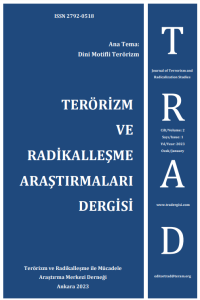BANGSAMORO ÇIKMAZI: KÖKTENDİNCİ İSLAMİ GRUPLAR, DEVLET ŞİDDETİ VE BARIŞ SÜRECİNİ BOZAN DİĞER UNSURLAR
Abstract
Filipinler hükümeti ile Moro halkı arasındaki çatışma, sürdürülebilir bir barışa ulaşma ihtimali olmadan, yarım yüzyılı aşkın bir süredir devam etmektedir. Çatışmanın sürekliliğine ilişkin uluslararası algı; İslam Cemiyeti (JI), El Kaide ve Irak Şam İslam Devleti (IŞİD) gibi daha büyük cihatçı örgütler ile de bağlantıları bulunan, şiddet yanlısı yerel kökdendinci İslami örgütlere odaklanmış olsa da; esasen çok daha karmaşık olan çatışmanın gerçekliği, yüzyıllardır süren sosyo-ekonomik marjinalleştirme, mülksüzleştirme, yerinden etme, ayrımcılık ve siyasi temsil eksikliği ile bağlantılıdır.
Bu makale, Filipinler Cumhuriyeti'nin 1946 yılında kuruluşundan bu yana süregelen Moro isyancı gruplar ile hükümet arasındaki çatışmanın öncelikle temel sebeplerini, sonra da çatışmanın aktörlerini ve yapısını zaman içerisinde dönüştüren sosyo-ekonomik ve siyasi gelişmelerin ayrıntılı tarihsel analizini sunmaktadır. Analiz ayrıca, bölgede cihatçılığın etkisi, barışa yönelik süregelen devlet politikaların tutarsızlığı, ve devlet yönetim kültürünün şiddet yanlılığı ve yozlaşma içermesi gibi önemli öğelere dikkat çekerken; Bangsamoro barış sürecinde çıkmaza girilmesinin sebebinin, yerel sosyo-kültürel, siyasi ve ekonomik gerçeklikleri gözardı eden Liberal barış inşaa süreci olduğunu ortaya koymaktadır.
Keywords
Mindanao Çatışma Terörizm İslamic Kökdendincilik Devlet Şiddeti Barış Süreçleri Barışı Bozan Unsurlar. Conflict Terrorism Islamic Extremism State Violence Peace Processes Peace Spoilers.
References
- Tan, S. K. (2009). A History of the Philippines. University of the Philippines Press.
Abstract
The conflict between the Philippines government and the Moro people has been ongoing for over a half-decade, with no prospect of achieving sustainable peace. Although the international perception of conflict endurance appears to be fixated on violent campaigns of separatist Islamic extremist groups linked with larger Jihadist groups like Jemaah Islamiyah (JI), al-Qaida, and Islamic State of Iraq and Syria (ISIS); the conflict has a much more complex reality on the ground stemming from the centuries-long socio-economic marginalisation, dispossession, displacement, discrimination, and lack of political representation.
Through a detailed historical survey, this article analyses the socio-economic and political developments that transformed the actors, and the nature of the clash between the government and the Moro insurgent groups since the Republic of the Philippines was established in 1946. In doing so, it highlights the negative impacts of the violent and corrupt governance culture, the influence of Jihadist ideals, and inconsistent state policies towards peace. Furthermore, it exposes the reason behind the peace impasse as a misadventure of Liberal peacebuilding that is incompatible with the local socio-cultural, political, and economic context.
References
- Tan, S. K. (2009). A History of the Philippines. University of the Philippines Press.
Details
| Primary Language | English |
|---|---|
| Journal Section | Research Articles |
| Authors | |
| Publication Date | January 30, 2023 |
| Published in Issue | Year 2023 Volume: 2 Issue: 1 |


